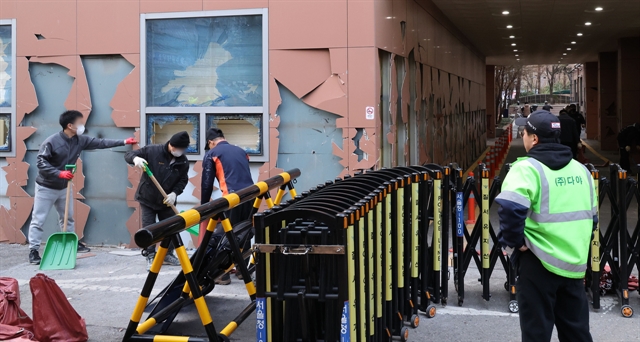 World
World


|
| Officials clean the damaged facilities at the Seoul Western District Court in Seoul on Sunday. — YONHAP/VNA Photo |
SEOUL — Sunday’s violent incursion at a Seoul court that approved an arrest warrant for President Yoon Suk Yeol, left an estimated 83 injured and 87 arrested.
It was the first time in 35 years that a crowd stormed and vandalized court property.
Though individuals have occasionally attempted personal attacks on judges out of resentment over rulings, Sunday’s attack involved physical confrontations and the destruction of property at the Seoul Western District Court. It has been described as one of the most significant challenges to judicial authority in decades.
Cheon Dae-yeop, chief of the Supreme Court’s Court Administration Office, said during an emergency inquiry at the National Assembly’s Legislation and Judiciary Committee on Monday that the court is considering pursuing compensation for damage caused by the violence.
Cheon said a number of Supreme Court justices, after inspecting the court’s interior on Sunday, emphasized the need for thorough accountability, adding that the damage was estimated at 600–700 million won ($460,000–$540,000).
“It has been suggested that there must be a rigorous investigation into such matters. It seems that (justices believe) all individuals involved in the illegal acts are being considered (for compensation).”
According to Cheon, damages include exterior wall destruction, broken windows, damaged shutters, vandalized duty room and CCTV storage devices, smashed computer monitors, desks and other furniture.
“Both myself and other justices, with over 30 years of judicial experience, are deeply shocked by this unprecedented and extraordinary situation,” Cheon told lawmakers.
”Acts of terror targeting individual judges or judicial proceedings are not only a complete denial of the rule of law but also an affront to all constitutional institutions. This is an extremely grave matter,” he added.
During the emergency inquiry, chairman Jung Cheong-rae of the Legislation and Judiciary Committee from the Democratic Party argued that illegal entry to the court should be treated as an act of insurrection.
“The organization, the forces behind it, and the planners must all be investigated, and those who participated in and incited propaganda must be identified and punished,” Jung told lawmakers.
But the ruling People Power Party lawmakers voiced concerns about framing the incident as insurrection.
“It is problematic to recklessly label individuals who did not physically participate in the use of force as accomplices,” PPP Rep. Joo Jin-woo argued. Other lawmakers also criticized the police for failing to properly block the protestors.
While Chief Justice of the Supreme Court Cho Hee-dae called an emergency meeting with justices on Monday to discuss measures to prevent similar incidents, the Supreme Prosecutors’ Office formed a nine-member task force to investigate the incident, labeling it an “illegal and violent occupation protest.”
Police, pledging a stern response, said Monday that they established a specialised investigative team led by the Seoul Metropolitan Police Agency. Additionally, the police reinforced security for Presiding Judge Cha Eun-kyung, who issued the arrest warrant for Yoon.
Those responsible for Sunday’s attack on the Seoul Western District Court are expected to face a series of criminal charges ranging from rioting to obstruction of public duties and breaking and entering of government buildings.
A former judge and lawyer Oh Ji-won said in a media interview Monday the punishments could be severe.
“Application (of charges) could vary for each individual (involved in the attack), but it appears they could very well be punished for special obstruction of public duty, intrusion into public structure, and destruction of public goods,” said Oh, who formerly served for nearly two decades on the bench of Suwon District Court and Daejeon District Court. All three charges are punishable by sentences ranging from three years to seven years in prison.
He said it is “of course possible” to apply the riot charge, defined by Article 115 of the Criminal Act as “assembling in large numbers and using violence or intimidation or taking destructive action.”
It is punishable by up to 10 years in prison.
Oh pointed out that the video evidence of the attack clearly proves that multiple people took part in the violent activities.
Meanwhile, regarding Sunday’s violence, Yoon on Monday released a statement from Seoul Detention Center through his legal team, saying, “I fully understand the public’s anger and frustration, but I urge everyone to express their opinions peacefully. Resorting to physical means can cause significant harm not only to the nation but also to individuals.”
On Monday, Yoon supporters gathered in front of the National Human Rights Commission of Korea (NHRC) building, where a meeting on the controversial agenda on guaranteeing Yoon’s defense rights during his impeachment trial, which was previously withdrawn, was planned at 3 p.m. It was postponed due to security concerns.
Meanwhile, the Constitutional Court of Korea, tasked with either upholding or overturning Yoon’s impeachment by June 11, said they asked the police to strengthen the security to prevent similar incidents.
“In light of the riot at the Seoul Western District Court, the Constitutional Court has devised plans to enhance security in the courtroom,” the court’s press officer Cheon Jae-yeon told reporters Monday.
“We also plan to request police assistance to reinforce security (outside the courtroom) as necessary, based on the level of threat.”
On Monday, police said Gyeonggi Nambu Provincial Police Agency’s Cyber Investigation Unit began a preliminary investigation into an unidentified individual who allegedly posted a threat on the online community, claiming they would “set fire to the Constitutional Court.”
A day before, some of Yoon’s staunch supporters moved their protest to the Constitutional Court in the afternoon after demonstrating at the Seoul Western District Court in the morning.
They held unregistered rallies near the court in Jongno-gu, and a man was arrested for trespassing after climbing over the court’s fence and another man was apprehended for carrying a crowbar, charged with possession of a concealed weapon.
According to unofficial police estimates, the protest near the court on Sunday drew approximately 800 participants at its peak. — The Korea Herald/ANN